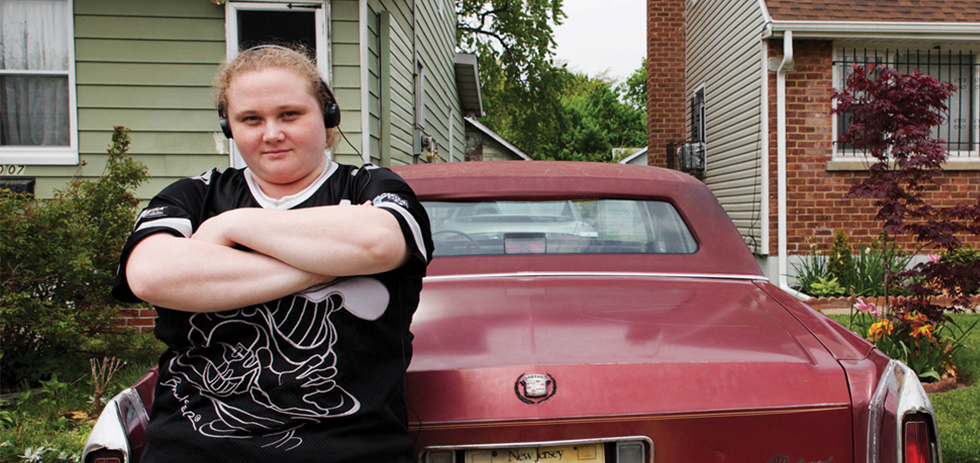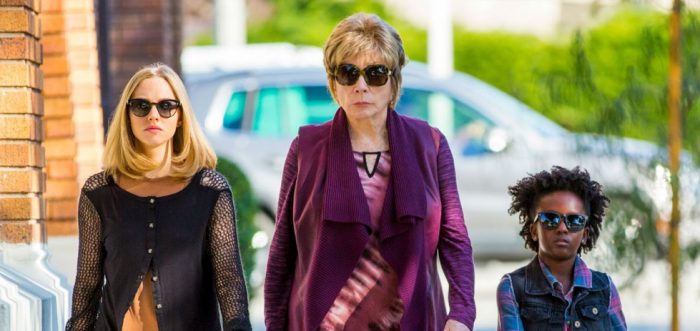January 26, 2017: At a Q&A session following the world premiere of The Last Word, a perfect feature for veteran Hollywood star Shirley MacLaine, she and director Mark Pellington answered questions for an adoring audience. Now 82 years old, MacLaine walked on stage to a standing ovation, until she begged us to sit down so she could follow. Her first comments observed the various Women’s Marches around the world, including that in Park City, affirming how important it is for people to protest for and defend their ideals. To MacLaine, the marches came from elements of the female in each woman, and the female in each man, responding to violence and oppression and war.
A heartwarming, bitter sentiment at a festival that has been tainted by last week’s inauguration, where I’ve heard fear and desperation in conversations around the city these past few days. But for MacLaine, describing her characterisation of retired advertising genius Harriet Lauler in The Last Word, “There’s nothing more important than going inside and knowing who you are.” For her, this film is an honest portrait of a woman making the best of herself and reaching her potential.
We are not quite meant to assume things are this straightforward. Harriet is painted as an awful person at first; she’s demanding and controlling, assumes she knows better than professionals, is very wealthy, and apparently lacks compassion. Through an attempt to define and defend her legacy, via a series of activities to improve her obituary, she becomes something of a free spirit, a woman with a lot of soul, love, and moral integrity. A legacy, Harriet declares, is “to write a story before it’s over.” MacLaine is terrific (although I’ll admit I’m a little biased), as is Amanda Seyfried playing the woman she enlists to write her premature obituary. It’s a fairly shallow film, predictable and sentimental, but there is one aspect that might be overlooked, once the film gains its momentum. At the film’s beginning, we watch Harriet eating, drinking, sitting alone in her large home, isolated and lonely and probably quite bored. At the end of a day, seemingly without much thought, she overdoses on booze and clonazepam and is taken to hospital for recovery. This sequence gives this otherwise lightweight film heft; it has sincerity and compassion for people who, after a certain age, may be forgotten. It comes from a Hollywood filmmaking tradition, says MacLaine, that tries to reflect real life back to itself.
Brigsby Bear is a film that approaches its subject with compassion, but doesn’t quite succeed. Coming from the Lonely Island team and directed by Dave McCary, featuring a cameo from Andy Samberg and a slew of clever, thoughtful jokes, it’s a typical “Sundance movie” and, appropriately, filmed in Salt Lake City and the surrounding mountains. Lots of audience laughs for this one, and it has a gentle and deadpan humour to it, with Kyle Mooney giving a nuanced performance as the complex 25-year-old James. It has an Unbreakable Kimmy Schmidt type premise, opening as though James is living with his parents in some sort of post-nuclear desert but revealing that he was abducted as an infant and raised by a couple who told some very serious lies. The film charts his struggle to fit back into regular life and learn how to socialise, despite his terrifying obsession with a fake television show invented by his abductor father. This film confronts an awful scenario with an uplifting plot framework that focuses on personal growth, though I feel like it’s a little irresponsible in its treatment of James as a victim of abuse. Of course comedy does this (“comedy is tragedy plus time,” and yes, he’s no longer held captive at this point), but Brigsby Bear offers a suggestion of resolution and recovery that is too sentimental for the scenario. By contrast, the creators of Unbreakable Kimmy Schmidt have never suggested such a neat resolution in two seasons of their show. Brigsby Bear made me extraordinarily uncomfortable but it’s worth seeing, I think, for Mooney, and a very talented Mark Hamill (someone asked him why he took the role; because he had lines, he jokingly answered, referencing his role in The Force Awakens).
The Last Word contains the song “A Woman’s Love Is Never Done”. It could be a song, too, from Patti Cake$, which may very well be the hit of Sundance. Selling to Fox Searchlight for a reported $10.5m, Geremy Jasper’s film stars Australian Danielle Macdonald, who was praised by festival director John Cooper as the best actor he’s seen since Jennifer Lawrence in 2010. Both The Last Word and Patti Cake$ feature many photographs of the stars as younger women. In drawing a connection to the stars behind the photographs, the filmmakers build on their characters and encourage a powerful, association with the star behind the scenes. It’s a heartfelt technique, and it’s surprisingly fun.

Patti Cake$ is a terrifically funny and heartfelt film, a modern day musical about three misfits who group together to create a record. In fact, it has two of the most unique misfits I’ve ever seen in the movies before: Patricia Dombrowski (Macdonald) and Bastard aka the Antichrist (Mamoudou Athie). Patricia aka Killa P aka Patti Cake$, as the film’s blurb states, wants to be a rapper with a record deal, but is currently restricted to writing “limmies” – as her nan (Cathy Moriarty) calls them – and battling on the streets of New Jersey. (I would give anything to see her battle Chanté Adams as Roxanne Shanté, who won the Dramatic Special Jury Award for Breakout Performance. That should have been a Sundance special event.) She’s constantly hurt and embarrassed by her local peers, who call her “Dumbo,” “fugly,” and many things more offensive, and her mother Barb (Bridget Everett) is only too quick to shame her aspirations of being a rapper, or ever getting out of the Jersey rut. The film opens in one of Patricia’s recurring dreams, bathed in bright green of rapper O-Z (Sahr Ngaujah), whose brand is ostensibly based on the Emerald City from The Wizard of Oz. Once Patricia meets him and he brutally lets her down, she sides with her mother, who has briefly shown her support, and Patricia’s next dream is bathed in red: “The Dombrowski sisters,” says the crude Barb occasionally, dreaming of youth, “settin’ the world on fire.” It’s a nice moment, when it becomes apparent that there’s a family connection, despite the cruel things her mother says.
“Filmed on location in New York and Dirty Jersey,” as the end credits tell us, the cinematography by Federico Cesca is excellent, with some beautiful night shots from Jersey, looking towards the figuratively distant glow of the Manhattan skyline. Patricia drives a bordeaux-coloured Cadillac – license plate PATTIWGN – and it’s perhaps the only evidence in the film of a now-lost Jersey opportunity, of a possible escape from poverty. Her mother also sings, and Patricia works in a dismal karaoke bar, so this film comprises almost constant musical performances, including an excellent visual duet that cuts between mother and daughter, scrutinising their rivalling faces. There’s an incredible fantasy interlude where Patricia is luxuriating as a mermaid superstar, and it’s so glorious you want it to come true.
Perhaps it’s this generally excited approach to Patricia’s life goals that makes the final act makeover scene work so well – while makeover scenes often endorse a limiting normativity that is an offence to diversity, they can sometimes – as in Ernst Lubitsch’s The Smiling Lieutenant (1931) – be a highlight of films for me. The final act also contains a thrilling performance by Killa P and her group, a reconciliation between mother and daughter, and a celebration of success and romantic fulfilment. It might sound cheesy, but the freshness and sincerity of Macdonald’s performance, along with the beautiful connections with her friends Bastard and Jheri (Siddharth Dhananjay), and the director’s energy and sharp observations of society and relationships, makes this film a winner. Ultimately, Patti Cake$ is a film about hard work and dreams fulfilled, and the closing credits are accompanied by a track from New Jersey native Bruce Springsteen. What a crazy, wonderful, appropriate cinematic moment to end this strange, almost surreal festival experience with.
